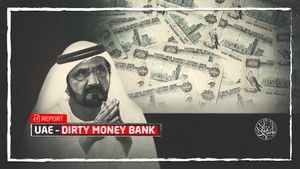The future of TikTok hangs delicately on the precipice as the United States prepares for what could be one of the largest social media upheavals of recent years. With the potential ban looming, set to take effect on January 19, the ripple effects of this move are already being felt across various sectors—from small businesses to individual creators and the broader advertising community.
The current legal frameworks surrounding this situation stem from national security concerns tied to TikTok's ownership by the Chinese company ByteDance. U.S. lawmakers have expressed fears about data privacy and the possibility of the Chinese government manipulating content on the platform, which boasts around 170 million users within the U.S. These fears culminated last week when the U.S. Court of Appeals upheld legislation requiring TikTok to either divest from ByteDance or face outright prohibition.
According to the latest court decision, the argument presented by TikTok—that the ban would violate First Amendment rights—has gained little traction. The court highlighted national security as the compelling interest, allowing legislation to withstand the strict scrutiny typically applied to free speech matters. Observers note how judicial deference to government assessments of risks posed by foreign adversaries played a pivotal role.
Legal experts remain divided about the eventual outcome. "While I still think a complete TikTok ban would likely be unconstitutional, the court's decision reframes the major focus on divestiture rather than solely targeting the app itself," said Daniel Lyons, referencing how the ruling strategically sidesteps weighty First Amendment discussions.
With the clock ticking on the divestiture deadline, TikTok is taking aggressive action to delay any potential ban. This includes filing emergency motions, which argue the app plays integral roles not only for its individual users but also contributes meaningfully to the economy. The platform registered over $24 billion to the U.S. GDP just last year, marking it as not only significant to creators but also to the nation's economic fabric.
Creators, influencers, and small businesses have thrived on TikTok's unique algorithm and accessibility. The app allows even budding entrepreneurs to connect with vast audiences, leading to substantial increases in sales and brand engagement. With nearly 7 million businesses leveraging TikTok for marketing, the potential ban could cripple many who depend heavily on the platform for outreach. Small boutique owners have shared how they've used TikTok to showcase products creatively, exemplifying how the platform has become more than just entertainment—it's a lifeline for many.
TikTok's ban wouldn't just create financial havoc; it presents existential dilemmas for influencers. "TikTok isn't just another social media platform—it's truly the launchpad for many creators," emphasized Jasmine Enberg, vice president and principal analyst at eMarketer. Influencers have diversified their platforms, making it easier for brands to reach their target demographics through distinctive creative content, but they fear the transition to alternative platforms like Instagram Reels or YouTube Shorts won’t compare. They worry about diminished views, lower engagement, and the potential loss of income streams.
While TikTok's competitors are actively courting displaced creators—by enhancing revenue models and advertising tools—the trepidations remain stark. Not all content creators feel these platforms can afford them the same engagement levels, stressing the unique dynamics TikTok offers.
Current TikTok entrepreneurs and influencers have found it prudent to start diversifying their outreach strategies. The ideal experience involves not putting all digital eggs in one basket—expanding outreach across other platforms, utilizing email marketing, and SEO strategies, alongside engaging their established viewer communities to retained loyal followings.
The approaching ban has sparked conversations about the best strategies to mitigate loss, with experts urging businesses and creators to adapt to this shifting digital market. Each entity must now reconsider their footing, adopting alternate approaches as they potentially face the draconian shift of losing TikTok.
At the heart of the matter lies a larger debate over the U.S. government's role in regulating foreign-owned tech companies. The confrontation pits national security interests against personal freedoms, with advocates for the ban firmly believing this move is necessary for safeguarding U.S. data integrity. Critics, on the other hand, argue such measures may stifle viable competition within Silicon Valley—creating fears of reduced consumer choices down the line.
Looking forward, TikTok’s destiny seems to be tied not just to legal judgments but also to public sentiment and ad spending patterns as businesses brace for what may be inevitable. Advertising budgets could quickly re-evaluate allocations, favoring platforms like Instagram and YouTube, which have already signaled readiness to attract disgruntled advertisers should TikTok's diversification efforts fail. "The ability to thrive on TikTok has made it imperative for brands targeting younger demographics. Its unique engagement strategies are irreplaceable," noted social media consultant Matt Navarra.
The far-reaching ramifications of the TikTok ban echo throughout the advertising framework. Numerous industries, particularly fashion, beauty, entertainment, and service-based sectors, heavily depend on TikTok's viral capabilities to showcase their brands. The anticipated loss of this trendy platform may impede innovation across these fields, as competitors strive to meet the unprecedented engagement standards set by TikTok.
For now, creators, businesses, and the advertising sector find themselves waiting with bated breath as they navigate the uncertain waters of TikTok's future. Many still hold onto the hope of finding resolution before the impending ban takes effect. Public interest remains piqued as key players within the political and business spheres wait to see whether TikTok will secure divestment or if broader restrictions will establish new precedents for tech regulation and censorship.
Meanwhile, the influencers of Connecticut and beyond prepare for the realities of their industry shifting grounds, striving to maintain relevance as the clock ticks down to January 19, evaluating strategies to weather the rapidly changing digital marketing environment and avoid potentially dire consequences for their businesses and livelihoods.



